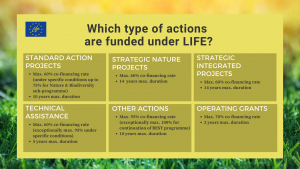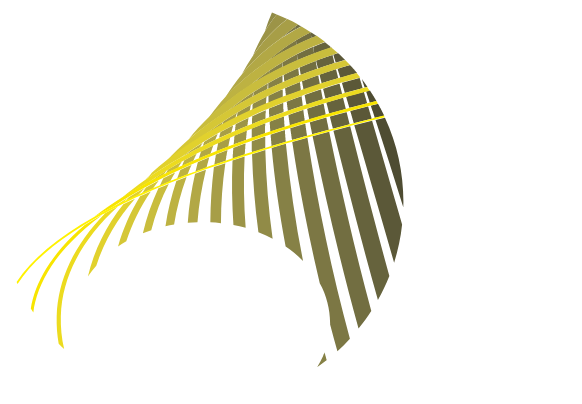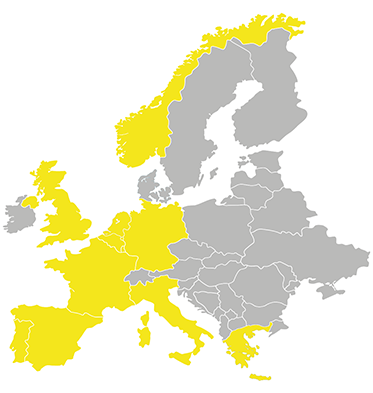Novelties within the LIFE programme 2021-2027
The success of the previous LIFE programme (2014-2020) has confirmed its great added value for the EU communities. Building on that success of its predecessor, the new LIFE programme will run from 2021 to 2027 and will continue to offer opportunities for public and private organisations.
Therefore, the European Commission has further strengthened the LIFE programme by giving it a wider scope compared to the previous programming period in 2014-2020. In addition to projects targeting nature & biodiversity and climate mitigation & adaptation, projects related to circular economy and transition to clean energy are now also explicitly targeted by the LIFE calls.
1. Structure
In the new programming period 2021-2027, the EC has expanded the structure of the LIFE funding instrument. The two previous fields, “Environment” and “Climate Action”, are now further expanded in 4 sub-programmes, presenting more opportunities for companies:
ENVIRONMENT:
- Nature and Biodiversity focuses on protection and restoration of Europe’s nature and reversing biodiversity loss. The sub-programme will co-fund nature conservation projects of biodiversity, habitats and species. It will support projects that contribute to the development and management of the Natura 2000 network. Furthermore, it will help achieving the objectives of the EU’s biodiversity strategy for 2030 part of the EU Green Deal.
- Circular Economy and Quality of Life aims at enabling the transition toward a sustainable, circular, toxic-free, energy-efficient and climate-resilient economy. In addition, it will also facilitate protecting, restoring and improving the quality of the environment. Thus, the sub-programme will co-finance projects mainly in the circular economy sector (recovery of resources from waste, water, air, noise, soil and chemical management) and environmental governance. The sub-programme provides mostly action grants for projects implementing innovative and best practice solutions in these areas through the so-called Standard Action Projects (SAPs). It also covers the implementation, monitoring and evaluation of EU environmental policy and law through the so-called Strategic Integrated Projects (SIPs).
CLIMATE:
- Climate Change Mitigation and Adaptation has three priorities. The Climate change mitigation priority area will provide grants for projects related to farming, land use, peatland management, renewable energies and energy efficiency. Meanwhile, the priority area on Climate change adaptation will focus mainly on funding projects related to urban adaptation and land-use planning, resilience of infrastructure, sustainable management of water in drought-prone areas, flood and coastal management, resilience of the agricultural, forestry and tourism sectors. The third priority, Climate governance and information, will co-fund projects supporting the operation of the European Climate Pact, sustainable finance activities, awareness raising, training and capacity building, knowledge development and stakeholder participation in climate change mitigation and adaptation areas.
- Clean Energy Transition is a continuation of the Intelligent Energy Europe (2003-2013) and Horizon 2020 Energy Efficiency (2014-2020) programmes. It remains a tool to support the delivery of EU policies in the field of sustainable energy. In particular, the European Green Deal, the Energy Union (2030 energy and climate targets) and the European Union’s 2050 long-term decarbonisation strategy.
2. Budget
Within the new 2021-2027 programme period, the European Commission allocated €5.4 billion to help tackle climate and environmental challenges. From the overall budget, €3.4 billion is considered for environmental projects, while €2 billion is planned for activities on climate action.
The total budget of the LIFE programme 2021-2027 has increased with 60% compared to the previous program period. This additional economic boost for the EU LIFE programme has been given to support the transition towards a climate-neutral Europe. Moreover, the LIFE programme is expected support the European Union in meeting its ambitious targets set in the European Green deal.

3. New Executive Agency
As of 1 April 2021, the LIFE programme is being managed by a brand-new executive agency: the European Climate, Infrastructure and Environment Executive Agency (CINEA). CINEA will follow up the implementation of the programme and oversee the management of the granted projects during the 2021-2027 programme period.
Main focus & objectives
The LIFE programme focuses on the 4 main areas: Nature and Biodiversity, Circular economy and quality of life, Climate change mitigation and adaptation and Clean energy transition. The key objective of the instrument is to ensure the development and integration of the four areas of action through targeted projects that aim to develop, demonstrate and promote new innovative techniques, approaches and best practices. Thus, helping build plans and strategies to contribute to the shift towards a clean, circular, energy-efficient, low-carbon and climate-resilient economy.
Within LIFE 2021-2027, the main key objectives are as follows:
- Support the transition to a circular economy and improve climate change mitigation: the specific sub-programme provides grants opportunities for helping to achieve strategic EU milestone policy objectives for a competitive and climate neutral economy within the next 30 years. It aims to contribute to the circular economy transition, as well as to protect and improve the quality of the EU’s air and water. All these actions are in line with the EU’s 2030 energy and climate policy framework and the commitments under the Paris Agreement on Climate Change.
- Stimulate more investments for the clean energy transition: the new sub-programme will be investing in activities related to energy efficiency and renewable energy. More particularly, it will aim to co-fund projects towards sectors and European regions lagging behind in the transition towards clean energy.
- An increased focus on nature and biodiversity: it will help mainstream nature and biodiversity policy objectives into other policies and financing programmes, such as agriculture and rural development, ensuring a more coherent approach across sectors.
- Easy and flexible approach to create and implement innovative approaches for tackling the environment and climate challenges in the European Union.
Which type of actions are funded under LIFE?
1. Standard Action Projects (SAPs or formerly know as “Traditional Projects”): the main objective is to develop, demonstrate and promote innovative techniques, methods and approaches, as well as contribute to the knowledge base and the application of best practices. In addition, to support the development, implementation, monitoring and enforcement of relevant EU legislation and policy, including by improving governance at all levels, in particular through enhancing capacities of public and private actors and involvement of civil society.
2. Strategic Nature Projects (SNAPs) aim at supporting the achievement of EU nature and biodiversity objectives. This is to be achieved by implementing coherent programmes of action in the Member States, in order to mainstream these objectives and priorities into other policies and financing instruments.
3. Strategic Integrated Projects (SIPs) support the implementation on a regional, multi-regional, national or transnational scale, of environmental or climate strategies or action plans developed by Member States’ authorities required by specific environmental, climate or relevant energy EU legislation or policy of the EU, while ensuring that stakeholders are involved and promoting coordination with and mobilisation of at least one other EU, national or private funding source.
4. Technical Assistance (TA): there are 3 types of TA calls:
- Preparation of SNAPs and SIPs (TA-PP);
- Preparation for facilitating the up-scaling and replication of results from other projects funded by the LIFE Programme, its predecessor programmes or other EU programmes and for accessing other EU financial instruments (TA-R);
- Capacity building of Member States authorities with low effective participation to the LIFE programme with a view to improving the National Contact Points services across the EU and to increasing the overall quality of proposals submitted (TA-CAP).
5. Other Actions (OA) needed for the purpose of achieving the general objective of the LIFE programme, including:
- Coordination and Support Actions (CSAs) for the transition to renewable energy and increased energy efficiency;
- Small Grant Facility on Biodiversity (BEST);
- Projects developed in cooperation with the EIT Knowledge and Innovation Communities (KICs), in particular projects contributing to the objectives and implementation of the EU Circular Economy Action Plan implemented by universities, research organisations, businesses and/or SMEs participating in a KIC;
- Action grants benefitting specific organisations (see Annex I of the LIFE Regulation);
- Additional projects responding to the EU legislative and policy priorities determined on annual basis, following a consultation with Member States.
6. Operating Grants support the functioning of non-profit making entities which are involved in the development, implementation and enforcement of EU legislation and policy, and which are primarily active in the area of the environment or climate action, including energy transition, in line with the objectives of the LIFE programme.

LIFE webinar – September 2021
PNO Innovation Belgium is organizing a dedicated webinar for the LIFE programme. The webinar addresses the opportunities for companies offered by the LIFE calls for Standard Action Projects (SAPs), with a focus on the following overarching themes:
- Environmental management,
- Resource efficiency,
- Emission reduction.
The webinar will be held on 06 September 2021 (11:00-12:00 CEST)
Our expert Marc De Coster will introduce the LIFE programme and presents the call modalities and application process. In the end of the webinar, a Q&A session will be held.
Link for registrations: https://www.pnoconsultants.com/be/evenementen/webinar-life-eu-funding-opportunities-for-companies/
Background
Since 1992, the LIFE programme has funded projects aiming to support sustainable development with a particular focus on natural conservation and climate change. LIFE is the only European Union’s funding instrument that is fully dedicated to the development of green policies. Nowadays, the programme is becoming a key tool in achieving the objectives and targets of the European Green Deal.
The previous LIFE programme, that ran from 2014 to 2020, had a financial envelope of €3.4 billion. The funding instrument supported many innovative projects, aiming to share best practices, to test technologies and to contribute to the achievement of ambitious European Union legislation and policy targets.
To date, this instrument has co-financed through grants more than 5.500 projects to support among others the protection of biodiversity, the improvement of water or air quality, waste management and the energy transition. Enterprises, mainly SMEs, public bodies, and private non-commercial organisations are the main beneficiaries of these projects.




